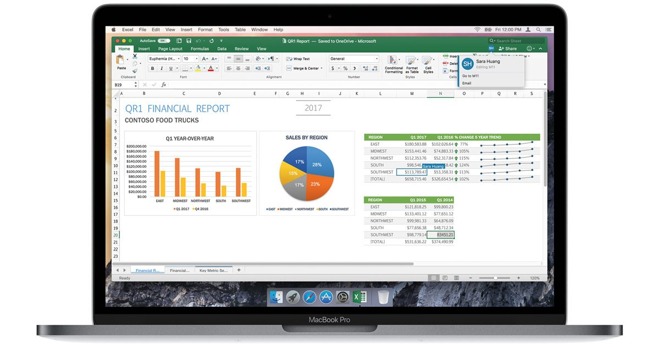Microsoft introduces Apple Silicon support in beta build of Excel for Mac
Microsoft has updated a beta build of Office for Mac to support upcoming but unreleased Apple Silicon devices.

Credit: Microsoft
Although Apple has yet to release a consumer-facing Apple Silicon device, the company is expected to debut new models with first-party processors at its Nov. 10 "One more thing" event.
Ahead of that date, Microsoft appears to be introducing some Apple Silicon-compatible features in its Office Insider beta testing program. A new build released on Nov. 2 contains support for Apple-designed processors for SQL Server connectivity settings.
More specifically, the built-in SQL Open Data Connectivity (ODBC) provider in Excel for Mac now supports Apple Silicon devices. Microsoft also added support for the TLS v1.2 communication protocol.
"This feature provides support for SQL Server ODBC data connections to work properly on new devices that have Apple Silicon processors, as well as support for SQL Servers that require secure connections via the TLS v1.2 protocol," Microsoft wrote in its release notes.
The Excel feature is one that allows users to access data from SQL server databases using baked-in ODBC drivers. Since the feature is in beta testing, it may be a while before it arrives on Apple Silicon devices.
Apple's first Macs with its own processors are rumored to be a 13-inch MacBook Pro, a 16-inch MacBook Pro, and a 13-inch MacBook Air.

Credit: Microsoft
Although Apple has yet to release a consumer-facing Apple Silicon device, the company is expected to debut new models with first-party processors at its Nov. 10 "One more thing" event.
Ahead of that date, Microsoft appears to be introducing some Apple Silicon-compatible features in its Office Insider beta testing program. A new build released on Nov. 2 contains support for Apple-designed processors for SQL Server connectivity settings.
More specifically, the built-in SQL Open Data Connectivity (ODBC) provider in Excel for Mac now supports Apple Silicon devices. Microsoft also added support for the TLS v1.2 communication protocol.
"This feature provides support for SQL Server ODBC data connections to work properly on new devices that have Apple Silicon processors, as well as support for SQL Servers that require secure connections via the TLS v1.2 protocol," Microsoft wrote in its release notes.
The Excel feature is one that allows users to access data from SQL server databases using baked-in ODBC drivers. Since the feature is in beta testing, it may be a while before it arrives on Apple Silicon devices.
Apple's first Macs with its own processors are rumored to be a 13-inch MacBook Pro, a 16-inch MacBook Pro, and a 13-inch MacBook Air.

Comments
Docker already runs on arm64 (I actually run it on an rpi4 for home automation), so Docker Desktop for MacOS will be likely ready for Apple Silicon on day 1. Most containerized products, especially open source servers like prometheus, haproxy, mariadb, nginx, etc., already provide docker images for arm64. You can check their repository listings check if they support arm64, and file issues if they do not. Millions of people around the world use these tools, so there is no reason they will not become available rather quickly.
means at minimum,
iMovie
Photos
Pages
...heck, ....well you get the picture
I'm sure we will continue to get OS updates for x86 hardware for at least five years since some of us have sinked a lot of money into hardware.
You can’t really go by the last transition. I believe the Mac user base was floating around 30-40 million then... now it is well over 100 million. It may take longer to hit a certain threshold where they feel the Intel base is no longer big enough to sustain.
I’m sure there will be an x64 hardware emulation application eventually... if there’s a need, some developer will come along and fill it. If not, your current Mac will continue to work - so I don’t see this need to buy a Linux box?
This doesn’t take away from what you said, quite the contrary, because it’s all those specialized Apple cores (arm64-based as they may all be, yes) and their respective calls and APIs which developers must target so as to ensure their software isn’t a crappy, lowest-common-denominator affair. But the ISA, and those entire big/little endian and instruction complexity discussions – which, mind you, are mostly moot anyway thanks to modern compilers –, are definitely not an issue for those developers which already have arm64 code ready.